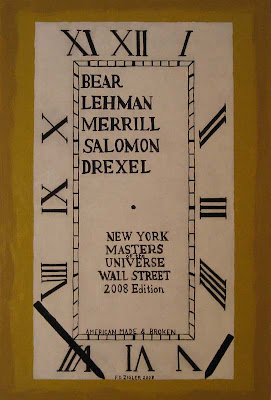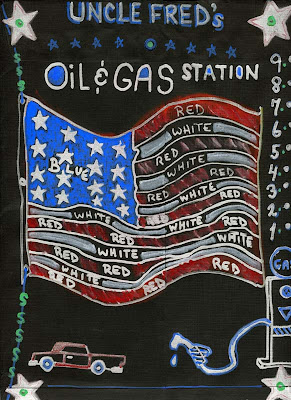
(I am reprinting a post from April 10, 2008 because I have noticed that people from all over the world read this posting. Evidently, I must have explained a few things about bonds, their price, their yield and the relationship that price, yield and time have to one another in the life of a bond rather well. So, for those that may have missed or not read this posting, here it is again. Enjoy.)
For some the arithmetic of money is a piece of cake, and yet for others it is shrouded in mystery. Today I am going to try to remove some of that mystery. To understand in a little more detail what is happening in the bond market and why some of this does not appear to be crystal clear, I would like to talk a little about time and money and the relationship time has to money. We have all heard the expression “time is money”, well today I want to take that another step.
First let us start with the parts of a bond, which is no more than a loan. There are several kinds of bonds. There are of course US Treasury bonds, municipal bonds issued by states, counties, cities and various authorities like school districts. There are of course corporate bonds and then there are many asset backed bonds like mortgage bonds and manufactured housing bonds. For the most part all bonds have certain things in common. First, they all have a maturity date. This is the date that the principal and final interest payment are paid to the owner of the bond. Second, a bond will have a stated rate of interest that will be paid usually semiannually to the bondholder.
Problems arise when interest rates change. They either go up or down. If interest rates go down, the value of the bond goes up, but if interest rates go up, the bondholder now has a bond worth less than its face or par value. What has happened? Now I am going to introduce a new phrase for some of you, Present Value. A bond has a present value based on its interest rate, its maturity and where interest rate are at present in the market. If you are holding a US Treasury bond with a 3% interest rate and interest rates for the same maturity as your bond goes up to 5%, your bond has to be discounted to its present value. Why would anyone buy a bond paying a 3% interest rate for a face or par value of $1,000 when they could buy the same quality bond with a 5% interest rate for $1,000? It is obvious, no one would. But, if the price of the bond is reduced to an amount that with the 3% interest rate and the capital appreciation the bondholder will receive when he cashes in the bond at maturity, the investment in the 3% US Treasury bond becomes a reasonable investment. So, the new buyer pays a discount for the bond from the bond’s original face value. Now if the 3% bond that is selling to yield 5% is held to maturity, a new term creeps in to the discussion, Yield to Maturity.
If you follow me this far good. Now we have to go one more step, but this is a big step. If the 3% bond has a maturity of say 5 years and sells at a yield to maturity of 5%, it will sell at a higher price than a 3% bond with a maturity of 10 years also selling at a yield to maturity of 5%. Now we get into something called the discount to the present value. As the bond with the longer maturity, say from a 5-year bond to a 10-year bond to a 20-year bond, the discount from the face or par value gets to be a bigger number. The price of the bond is tied to two things. The stated interest rate of the bond and the years to maturity of the bond. I like to refer to this as the inverse relationship between yield and price. As the yield to maturity on a bond goes up, the price of that bond moves in the opposite direction, it goes down. So, if you believe interest rates are going to go up because of inflation and you want to sell your bonds, the bond trader will pay you a price for your bonds based on what the stated interest rate on your bond is, and how many years, months and days until it matures and pays its principal. With knowing the interest rate, the maturity date and a yield to maturity, the bond trader can come up with a price that they will pay you for your bond. This price may be a discount if interest rates have gone up, or it may be a premium if interest rates go down. Simple enough, so what is the problem?
The problem occurs when bond traders have no confidence in the bonds they are trading and stop bidding on the bonds they make a market in. It is no different than the airlines grounding 800 flights and nobody moves around the country. Everything comes to a stop. Now we have a melt down, because unless you are selling a US Treasury and not a mortgage-backed or other asset-backed bond, you are in trouble. No one is bidding for your bond and you now have a non-marketable bond. Do you still want to be a bond portfolio manager when you grow up?
It is important to know the difference between the words marketable and liquid. A money market fund is liquid or is said to have liquidity. You put a dollar in and you get your dollar out plus the interest you earned while the money market fund held your dollar. Marketable is that there is a market for your bonds or stocks. Their price can go up or down, but it is easy to convert your investment to cash. A house is marketable, but not as marketable as a stock that trades regularly on the New York Stock Exchange. If you are a pension fund with several billion dollars in bonds and the bond market is not making a market in the bonds you own in your pension fund bond portfolio, you now can not actively manage that bond portfolio. At this point, all the terms like interest rate, par value, maturity date, yield to maturity cease to mean anything because everyone is grounded. No flights are taking off and no flights are landing, nothing moves.
Oh how I would love to pull out my soap box around now and just lay into all those people that believe in less regulation to no regulation to laisse faire economics in the 21st century, but I will not do that today. You know when you build a frame house, and you build walls with studs 16 inches on center. Why? Why not 32 inches on center, or 64 inches on center? Does it have to do with something called stress and weight bearing stress? Abstract things have weight bearing stress too. Take enough “studs” out of the equation and you know what you get? You get grounded or a melt down. Take your pick.
Stay tuned.




















































